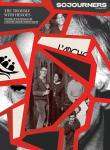WITH THIS MONTH'S liturgical arc, we move from Epiphany to Lent: from a season of illumination to one of penitence. You’d think they would be reversed, though. You’d think it would be necessary to do the soul-searching first, to clean house before we get to invite God over for tea.
But the natural order of things always becomes topsy-turvy when God gets involved. God’s time “doubles back and loops around and ends up looking something like ... the name ‘Jeremy Bearimy’ in cursive English,” as Michael (Ted Danson) explains to Eleanor (Kristen Bell) in television’s The Good Place. The dot over Bearimy’s “i” represents Tuesdays, July, and “when nothing never occurs.”
Joking aside, this is the gift of the liturgical calendar: It lets us glimpse what it’s like to live in God’s time rather than our own. We don’t need to be worthy of an encounter with God before that encounter can happen because we constantly live in the kingdom space of already-not-yet. Revelation and repentance are like the proverbial chicken and egg: No one really knows which comes first, and it probably doesn’t matter in the end.
Divine time’s topsy-turvy nature is also why Christians are called to discern the difference between the “wisdom of this age” and God’s wisdom (1 Corinthians 2:6-7). What this month’s readings might call us to ponder, then, is not where human and Divine wisdoms diverge but, rather, where on Jeremy Bearimy’s curves they converge. Perhaps even on the dot of the “i.”
February 5
This Little Light
Isaiah 58:1-12; Psalm 112:1-10; 1 Corinthians 2:1-16; Matthew 5:13-20
THEOLOGIAN FREDERICK BUECHNER described vocation as the place where our “deep gladness and the world’s deep hunger meet.” When I share this quotation with my theology students, they get annoyed. “That’s a lot of pressure,” they say. “How on earth are we supposed to figure out that?!” Despite agreeing with them, I still think of this quotation every time I encounter the well-known passage on salt and light in Matthew 5. “Hide it under a bushel, no!” the song goes, “I’m gonna let it shine.” Buechner’s insight in relation to this passage urges me to consider what “good works” I’m capable of doing that could help others “give glory to [my] Father in heaven” (Matthew 5:16). Even — perhaps especially — when I can’t imagine I have any.
I also share with my students a quotation from Mary Oliver’s poem “The Summer Day.” “Tell me,” Oliver asks, “what is it you plan to do / with your one wild and precious life?” Another huge question! But that’s the problem with quotations: Out of context, they often lose their true meaning. Because, in the rest of the poem, Oliver describes in detail a grasshopper lazing in the grass, eating sugar from her hand, looking around, and washing its face. And when Oliver looks at this grasshopper, she realizes that prayer consists in doing likewise. Prayer is feeling soft grass on our knees, attending to simplicity, and not only accepting but reveling in our finitude. It is the stuff of everyday life. So, what if my deepest pleasure and the world’s deepest hunger were just that? The slow, simple embrace of the finite. God’s glory revealed in the minutiae of each day. “This little light of mine,” I’d sing, “God’s gonna make it shine.”
February 12
Spirit and Flesh
Deuteronomy 30:15-20; Psalm 119:1-8; 1 Corinthians 3:1-9; Matthew 5:21-37
IN PAUL'S LETTER to the community at Corinth, he seems to draw a stark line between spirit and flesh, aligning the former with maturity and the latter with infantile things (1 Corinthians 3:1-9). “Grow up,” he says, “or you’ll never be able to grasp the good news.” In other words, you can’t feast at Christ’s banquet if you can’t eat solid food. But what should we make of Paul’s seeming degradation of flesh in this passage when Christians worship the God who became flesh? If God became embodied to be known, then surely we don’t need to become disembodied to receive that knowledge.
Part of the problem here is that the ways of thinking in the late modern era (from the European Renaissance to the mid-20th century) distort our scriptural interpretations. Indeed, René Descartes — a key figure of modernity — famously proclaimed, “I think, therefore I am.” In other words, the self-aware thought being “thunk” is how I know that I exist. Modernity rejects the more embodied “in God I live and move and have my being” — and thereby am (see Acts 17:28). This is the baggage we bring to scripture every time we read it. But the ancients understood our existence as having a much greater continuity of spirit, flesh, body, soul, mind, and heart. “To be or not to be” a spiritual infant was not the question for Paul — with all due respect to the Prince of Denmark. Rather, Paul understood spirit to infuse flesh, to be unknowable apart from it, just as flesh becomes living when God breathes life into it. God wants to know us and be known by us through our heads, hearts, and bodies: in and through all that we are, and all that God is calling us to be.
February 19
An Ol’ Boys Club
Exodus 24:12-18; Psalm 2; 2 Peter 1:16-21; Matthew 17:1-9
I ONCE KNEW a woman, Joan, who described Jesus’ transfiguration (Matthew 17:1-9) as “an ol’ boys club.” She wasn’t far off! In this story, Jesus takes Peter, James, and John to the top of a mountain, where his face shines “like the sun” and his clothes become “dazzling white” (verse 2). Next thing you know, Moses and Elijah show up too. And all six fellas start having a nice chat (verse 3). So nice, in fact, that Peter offers to “set up three tents” (verse 4) for them all to stay awhile. I can see the wheels turning in Peter’s head: “If I build these guys some houses, maybe they’ll let me visit and we can get this messianic party started.” Maybe it is Peter’s boldness here that leads James and John (and their mom) to check if Jesus will let them sit at his left and right sides in heaven just a few chapters later (see Matthew 20:20-28).
Peter, James, and John are all invited to this sacred moment to see their Lord transformed. Yet, they mostly try to turn it to their own advantage and solidify their entry to the old boys club. But Jesus says, “No, you boys got to get back down the mountain and on to the business of helping the people.” Or, at least, that’s what Jesus says in Joan’s version. Prayer and contemplation are important — paramount, in fact — but they can also become a mere deployment of social privilege if they don’t translate to service. You cannot have one without the other.
We typically read the transfiguration as a story revealing Jesus as the Christ: the incarnation of the God with whom Moses spent 40 days and nights on Sinai (see Exodus 24:12-18) and the God who whisked Elijah up into heaven alive (see 2 Kings 2:11). But now, thanks to Joan, I will always read it as a call to contemplative activism, as God’s invitation to both the mountaintops and the valleys.
February 26
In Search of Wisdom
Genesis 2:15-17; 3:1-7; Psalm 32; Romans 5:12-19; Matthew 4:1-11
THE ARRIVAL OF Jesus’ transfiguration story officially shifts our liturgical calendar from Epiphany to Lent, from the season of revelation to the season of penitence — which means that we get to start scripture’s story all over again this week with the so-called “Fall of Man” in Genesis 2 and 3.
The moment the church began using the Genesis story to justify silencing women (see 1 Timothy 2:11-14), it took on an interpretive life that far exceeds what is in the text. From Augustine rooting the advent of sexual arousal in the Fall to the portrayal throughout the history of European art of Eve as a temptress, interpretations of Genesis 2 and 3 have been used to present women as erratic and untrustworthy and our desire as something to be feared. But what was it that Eve actually desired in the story?
In these readings, Christians are called to discern between human and divine wisdom, and to reject the former for the latter. Centuries of sexism have led us to understand Eve as the progenitor of sin. But what if we saw her instead as the first human to truly yearn for “God’s wisdom, secret and hidden, which God decreed before the ages for our glory” (1 Corinthians 2:7)? What if the fruit in the garden was a version of the “solid food” that Paul says we need (1 Corinthians 3:2)? Sure, Eve messed up in how she went about it. But don’t we all? If we interpret Eve’s actions as simply in error rather than as “fallen,” then we could also see her as desiring the good rather than embracing what is evil. If we could view Eve this way, then she would have a lot to teach us about how we can all pursue God’s wisdom together.

Got something to say about what you're reading? We value your feedback!






